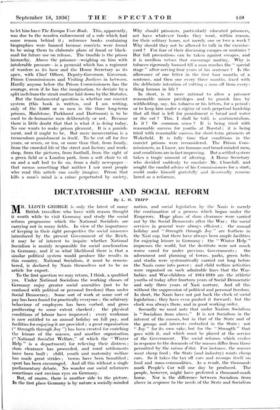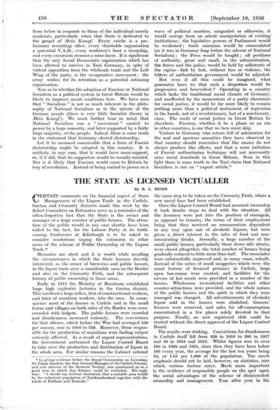DICTATORSHIP AND SOCIAL REFORM
By L. H. 'TRIPP article for export-. • To the first question we may return, I think, a qualified yes. Under National Socialism the working classes of Germany enjoy greater social amenities (not • to be confused with political or personal freedom) than under Social Democracy: Some sort of work at some sort of pay- has been found for practically everyone ; the arbitrary behaviour - of employers has been curbed, and gross profiteering to some extent checked ; the physical conditions of labour have improved ; every workman is. now entitled to an annual holiday on full pay,- and facilities for_enjoying it are provided ;- a great organisation (" Strength through Joy ") has been created for enriching the leisure of the- masses, and another organisation (" National Socialist Welfare," of which the " Winter Help " is a department) for relieving their distress ; slum clearance has proceeded, and rural settlements have been built ; 'child, youth and- maternity welfare has made great strides ; - towns 'have been beautified ; sport has-been encouraged.- And all this without a single parliamentary debate. No wonder our social reformers sometimes cast envious eyes on Germany.
But, 'of course,- there • is another side :to the-picture. In-the first place 'Germany is -by- nature socially-minded nation, and social legislation by the Nazis is merely the continuation of a process which began under the Emperors. Huge plans of slum clearance were carried out by the Social Democrats after the War ; the social services in general were always efficient ; the annual holiday and " Strength through Joy " are feathers in the Nazi cap, but there have always been ample' facilities for enjoying leisure in Germany ; the " Winter Help " impresses the world, but the destitute were not much worse cared for under previous Governments ; the adornment and planning of towns, parks, green belts and stadia were systematically carried out long before the Nazis came into power ; and child welfare activities were organised on such admirable lines that the War- babies and War-children of 19144919 are the athletic youths of today after fourteen years of Social Democratic and only three years of- Nazi nurture. And all this without the suppression of political and personal freedom. In short, the Nazis have not put back the clock of social legislation ; they 'have even pushed it forward; but the clock was always there, and in good working order.
- Secondly we must note that under Nazism Socialism is " Socialism from above." It is-.not Socialism in the interest of the masses, but in that of the State and of the groups and interests embodied in the State ; not " Joy " for its own sake, but for the " Strength " that goes with it, and which must • be placed at the service of the Government. The social reforms which evolve in response to the demands-of the masses differ from those permitted by the raison &Rat. For instance, the masses want cheap food ; the State (and industry) wants cheap cars. So it takes the tax off cars and recoups itself food and mass-commodities. As a result, the thousand= mark People's Car will one day be produced. The people, however, might have preferred a thousand-mark home. Nor is the difference between Socialism from above in response to the needs of the State and Socialism from below in response to those of the individual merely academic, particularly when that State is dedicated to the gospel of Mein Katnpf. Every creche is a pre- liminary recruiting office, every charitable organisation a potential V.A.D., every workmen's liner a troopship, and every excursion steamer a mine-layer. It is significant that the only Social Democratic organisation which has been allowed to survive in Nazi Germany, in spite of violent opposition from the wholesale trade and the Left Wing of the party, is the co-operative movement : the army wishes for its retention as a potential rationing organisation.
Now as to whether the adoption of Fascism or National Socialism as a political system in Great Britain would be likely to improve social conditions here. We have seen that " Socialism " is not so much inherent in the philo- sophy of National Socialism as in the nature of the German people (there is very little Socialist theory in Mein Kampf). We must further bear in mind that National Socialism was a " movement " carried to power by a large minority, and later supported by a fairly large majority, of the people. Indeed, there is some truth in the statement that Germany elected dictatorship.
Let it be assumed conceivable that a form of Fascist dictatorship might be adopted in this country. It is unlikely, in any case, that it would have mass-support, or, if it did, that its supporters would be socially-minded. Nor is it likely that Fascism would come to Britain by way of revolution. Instead of being carried to power on a wave of political emotion, misguided or otherwise, it Would emerge froth an adroit manipulation of existing institutions ; the legislative powers of Parliament would be - Weakened ; _ trade unionism would be emasculated _(as it was in Germany long before the advent of National Socialism) ; the Press would be bought ; ' all poSitions of authinity; great and small, in the' administration, the forces and the police, would be held by adherents of the regime—link by link, without fuss or violence, the fetters of authoritarian government would be adjusted.
But even if all this could be imagined; what guarantee have we that such a despotism would be progressive and benevolent ? Operating in a country which lacks the traditional social climate of Gerniany, and unaffected by the momentum of a party clamorous for social justice, it would be far more likely to remain nothing more than a political instrument' of repression in the hands, not of a revolutionary, but of a reactionary, class. The seeds of social justice in Great Britain lie elsewhere. Fascism, whether it be a phase or an era in other countries, is one that we here must skip.
Visitors to Germany who return full of admiration for the real and specious amenities they have observed in that country should remember that like causes do not always produce like effects, and that a mere imitation of Fascist authoritarian technique will not necessarily raise social standards in Great Britain. Seen in this light there is some truth in the Nazi claim that Motional Socialism is not an " export article."











































 Previous page
Previous page